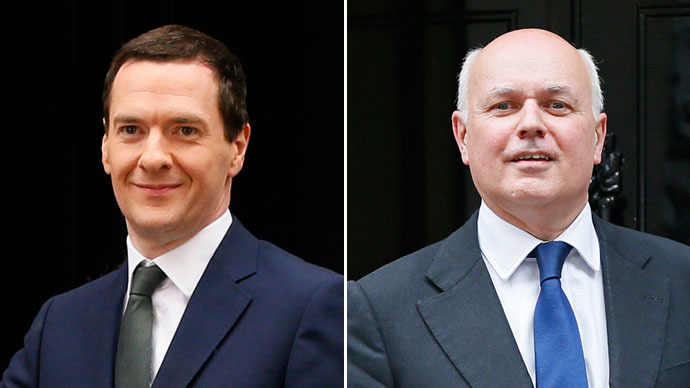‘Race to the bottom’: £15bn welfare cuts will cause ‘enormous hardship,’ says economist

The Treasury’s proposed £15 billion worth of cuts to welfare spending will fuel a sharp rise in poverty, “enormous hardship” and a “race to the bottom led by the government,” an anti-austerity economist warns.
Treasury chiefs have called upon the Department for Work and Pensions to identify £15 billion worth of welfare cuts – £3 billion more than the Tories proposed during the general election race.
They have directly approached Secretary of State for Work and Pensions Iain Duncan Smith, suggesting child tax credits and working tax credits could be sources for these cuts. Details of the scale of the Treasury’s austerity agenda surfaced on BBC Two’s Newsnight Monday night program.
Treasury now wants DWP to make 15bn welfare cuts. From where? http://t.co/WuMvJ6R1A0pic.twitter.com/i1UrfwV5lb
— Disability Rights UK (@DisRightsUK) June 16, 2015
Left-of-center economist Michael Burke expressed little surprise at the development.
Speaking to RT on Tuesday, he said the Conservative Party planned deep cuts to welfare spending prior to the election but simply refused to specify where they would fall.
Burke said the Tories rolled out a series of “incredible promises” on protecting core aspects of government spending, as opposed to raising revenue via tax increases.
He stressed such a fiscal path meant the party’s pledge of balancing the budget and cultivating a surplus was impossible unless deeper cuts than those suggested in the Tory manifesto were imposed.
The government are demanding another £15 billion in cuts to welfare which will decimate essential basic services. http://t.co/TXzXXEQSAJ
— Fuel Poverty Action (@FuelPovAction) June 16, 2015
Burke suggested the proposed cuts to child tax credits and working tax credits illustrate a growing divide between Tory policy and the common good.
“Of those of working age, the bulk of those payments are to people in work. This partly compensates for low pay, high prices and rents,” he said.
Burke said the “ultimate beneficiaries” of government cuts to child tax and working tax credits are firms who pay low wages. He stressed these firms are “indirectly subsidized” by the government.
He predicted the proposed cuts to welfare spending would further entrench poverty and inequality in Britain.
“The alternative would be to invest to create the high-skill, high-pay jobs we need. Instead, this is the race to the bottom led by the government,” Burke said.
Austerity overdrive
Advocates of cuts in public spending say an increase in welfare cuts from £12 billion to £15 billion would allow other sectors of government spending to be ring-fenced. However, critics argue further squeezing of welfare spending would impact most severely on Britain’s working poor.
Should these cuts to welfare spending be implemented, they will signal a death knell for Conservative attempts to eclipse Labour as a party for working people.
The grueling impact of austerity has been felt by Britain’s most vulnerable throughout the previous coalition government’s term in office.
Fresh figures released by the Organization for Economic Cooperation and Development (OECD) indicate that the Liberal Democrat-Conservative coalition in power from 2010 to 2015 slashed public spending as deeply as those states in the grip of the Eurozone crisis.
So this £12 billion of welfare cuts wasn't true. It appears Osborne has asked Iain Duncan Smith to find £15 BILLION now. *resists swearing*
— Jon Swindon (@swindon81) June 16, 2015
The figures, released Monday, found that government spending per person between 2009 and 2013 plummeted in Britain at a higher rate than in Portugal and Italy.
The OECD’s data shows the previous government’s deficit reduction plan relied on spending cuts as opposed to tax increases more than other EU state in economic crisis.
The figures show only Greece, Ireland and Spain slashed public spending per person more aggressively than Britain between 2009 and 2013.
As the Eurozone crisis gathered momentum and the levels of socialized bank debt these states were forced to contend with soared, each was handed a so-called bailout from pro-market EU institutions and the International Monetary Fund (IMF) – with tough strings attached.
Yet as Ireland, Greece and Spain’s borrowing costs soared, Britain saw its bond yields plummet to new lows.
The OECD’s figures, due to be published in July as part of its “Government at a Glance” report, reveal that government spending in relation to national income fell in Britain by almost 200 percent more than other OECD states.
‘Roller coaster ride’
Observers suggest another means of slashing welfare spending could be to further reduce the state’s cap on welfare spending by £3,000. This would bring the Tories’ proposed welfare cap from £23,000 to £20,000.
The Tory government’s plan to plow ahead with further austerity has angered campaigners, trade unionists and academics who warn of the rise of abject poverty in Britain.
In a state increasingly characterized by zero-hours contracts, social cleansing, and drastic welfare reforms, they argue further austerity will impact heavily on Britain’s most vulnerable men, women and children.
In the run-up to May’s general election, the Office of Budget Responsibility said Tory cuts would propel the nation on a “rollercoaster ride.”
George Osborne’s Tea Party settlement is the stuff of cold sweats http://t.co/Kxk7iOAqWh Are we saying goodbye to democracy, for good?
— Richard Murphy (@RichardJMurphy) June 16, 2015
Human rights and social justice campaigners in Britain have repeatedly warned spending cuts implemented since 2010 have dismantled the welfare state and impacted severely on vulnerable members of society.
The crisis of growing poverty among Britons who have been impacted by these reforms has been laid bare by a series of damning studies published in recent months.
In April, hundreds of psychotherapists, counselors and mental health practitioners warned “malign” welfare changes are having a detrimental effect on Britons’ psychological and emotional wellbeing.
Another report, released May 1, revealed that teachers have taken to washing children’s clothes, feeding them packed lunches and offering pupils’ haircuts as they warn of a resurgence of Victorian levels of poverty in the UK.












